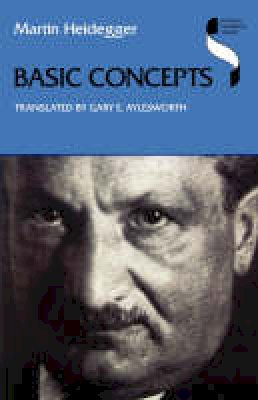
Stock image for illustration purposes only - book cover, edition or condition may vary.
Basic Concepts
Martin Heidegger
€ 23.39
FREE Delivery in Ireland
Description for Basic Concepts
Paperback. Concise introduction to Heidegger's later thought. Translator(s): Aylesworth, Gary E. Series: Studies in Continental Thought. Num Pages: 128 pages, black & white illustrations. BIC Classification: HPCF. Category: (P) Professional & Vocational. Dimension: 218 x 245 x 13. Weight in Grams: 190.
... an excellent and accessible introduction to the later Heidegger. -Choice Heidegger's method is unmistakable in these lectures.... This is thinking that is alive, always green. -Review of Metaphysics This translation... enlarges our historical view of the probing advances in Heidegger's thought. -International Studies in Philosophy This clear translation of Martin Heidegger's lecture course at the University of Freiburg in the winter semester of 1941, first published in German in 1981 as Grundbegriffe (volume 51 of Heidegger's collected works), offers a concise introduction to the new directions of his later thought. In this transition, Heidegger shifts from the problem of the meaning of being to the question of the truth of being.
Product Details
Publisher
Indiana University Press
Format
Paperback
Publication date
1998
Series
Studies in Continental Thought
Condition
New
Number of Pages
128
Place of Publication
Bloomington, IN, United States
ISBN
9780253212153
SKU
V9780253212153
Shipping Time
Usually ships in 7 to 11 working days
Ref
99-1
About Martin Heidegger
Gary E. Aylesworth teaches philosophy at Eastern Illinois University.
Reviews for Basic Concepts
This translation is an excellent and accessible introduction to the later Heidegger. Published posthumously in 1981 as Grundbegriffe, this 1941 lecture series is an important marker in Heidegger's thinking and gives us access to his respelling out of the question of being and time. Here he sets forth eight guidewords that seem to be irresolvably contradictory assertions about being. The fact that being eludes modern reflection leads Heidegger to return to the beginnings of Western philosophical thought in search of the fateful decision about how being was to be thought-and by extension, how human being was to be defined. He asks, What if all previous answers to the questions of who we are were merely the repeated application of a [fatefully wrong] answer given long ago? While Heidegger spells out more fully his critique of humanist definitions of man in Letter on Humanism (1947), the present text shows us how his view there arises out of the quest for the meaning of being in the face of our modern forgetfulness of the ontological difference. In the second part of this work, Heidegger turns to two fragments from Anaximander, which, taken together in his interpretation, articulate at the very dawn of Western philosophy an initial saying of being and time together as timely emergence. Aylesworth's well-translated edition is essential for undergraduate libraries, recommended also for general readers, graduate students, faculty.June 1994
R. E. Palmer
MacMurray
This translation . . . enlarges our historical view of the probing advances in Heidegger's thought.
International Studies in Philosophy
Heidegger's method is unmistakable in these lectures. . . . This is thinking that is alive, always green.
Review of Metaphysics
R. E. Palmer
MacMurray
This translation . . . enlarges our historical view of the probing advances in Heidegger's thought.
International Studies in Philosophy
Heidegger's method is unmistakable in these lectures. . . . This is thinking that is alive, always green.
Review of Metaphysics
